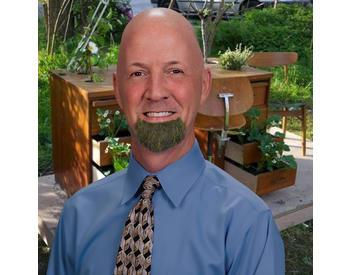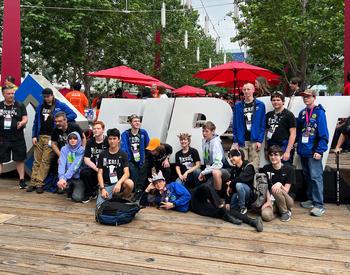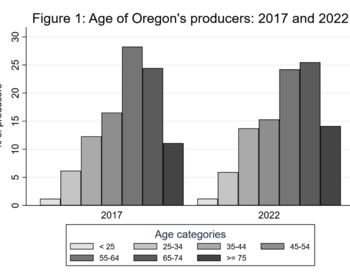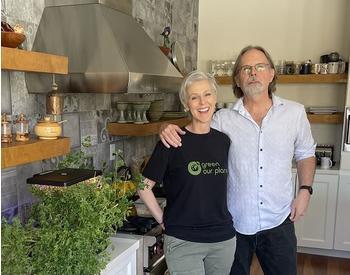Transcript
00:00:09 Michelle
Welcome to the farm to school podcast, where you will hear stories of how youth thrive and farmers prosper when we grow, cook and eat delicious, nutritious in schools.
00:00:20 Rick
We're your host, Rick Sherman.
00:00:21 Michelle
And I'm Michelle Marketeyn, and we are farm to school coordinators for the state of Oregon. And we have another state powerhouse here in the Rootopia Studio today, Jennifer Young. Welcome, Jennifer!
00:00:35 Jennifer Young
Ohh, thank you for having me today.
00:00:40 Rick
No problem. Yeah, we've known Jennifer a long time. Haven't we?
00:00:43 Michelle
We have actually. I was thinking about this on the way here. I first met you, Jennifer, in 2007, maybe even 2006 and it was one of those state level moments when we were like… What is this? People are saying let's get local foods in the schools and let's connect with school gardens. I don't even know if we use the phrase farm to school at that time.
00:01:07 Jennifer Young
No, I don't think we did.
00:01:09 Michelle
And you were at the health department?
00:01:13 Jennifer Young
That's right. The Public health division in Oregon.
00:01:16 Michelle
And we were like, well, this is all about health. It's about the environment. It's about the economy, it's about education. And so we did, we literally had a roundup meeting and you organized us.
00:01:27 Jennifer Young
Yep, I remember that. I actually remember what I was wearing during that meeting!
00:01:33 Rick
Wow.
00:01:34 Michelle
I remember it was one of the most satisfying.. because usually strategic planning and coordinating with a lot of state agencies and nonprofits is like an individuals is super, like messy and people trip over words. But we actually came up with a mission statement. Literally, in a matter of hours.
00:01:54 Jennifer Young
I remember you were on your computer and you were typing away as we were talking.
00:01:57 Rick
You know, I don't remember what I had for breakfast this morning. How do you do that?
00:02:03 Jennifer Young
Well, I'm not usually one that remembers what I wore, but I had just bought some new clothes.
00:02:07 Michelle
Let's be real. It was a historic moment for the state of Oregon, actually, that work we had done defining a mission in a direction is what led to the Oregon Farm to school and school Garden network. Now its own entity, which is amazing and I guess Jennifer, from your perspective and a lot of it, is seeped in health, like what brings you to farm to school or attracts you to farm to school.
00:02:35 Jennifer Young
Well, so many things. My background is in public health, nutrition and so there's a good connection there. I love to garden personally and I had, you know, at the time we were doing that work back in 2006, my kids were in elementary and middle school and we had a school garden at the school where they went to that I had organized and, you know, right before that meeting, you know, maybe a year or two before that meeting. I remember driving home from work one day and I was listening to the radio and there was a segment where they were interviewing students at Portland Public School who were having a local lunch and the students were they were eating drumsticks. That was part of their lunch and chicken drums, chicken drumsticks. Yeah. And they were just amazed that there was a bone in their chicken and you know the whole thought of you know, they're so used to eating at home, at school.
00:03:48 Rick
Yeah, don't chickens normally come in nugget form?
00:03:50 Jennifer Young
(laughs) Yeah, Nuggets. Without a bone and I was driving home and I was thinking about that, like, how far away we're getting from the source of our food and probably 3 or 4 weeks later, some chicks that we had bought about six months earlier and were raising for their eggs started laying and I said to my own kids, tonight we're gonna have eggs from the chickens and they were so upset, they said. We're not eating eggs from a chicken and I thought ohh my gosh, even in my own home, my kids don't realize the source of where their food is coming from. And so the whole concept of farm to school and school gardens, it just, it kind of filled in that gap between, you know, working to make school food more appealing and accessible and connect students to where their food is really coming from.
00:04:53 Rick
Thank you, Jennifer, for that. That really resonates with me as a former food service director who was one of the ones in the trenches, so to speak, getting the meals to the kids and stuff. So I kind of saw that first hand. But I and I knew you back in the day when you worked for the public health department. And just so some people know having someone in and around the health department is kind of a common thing in the farm to school world. We usually have it. Someone in either the Department of Ed or Department of AG. But some states have somebody who is their farm School lead as a Department of Health person. So it's common to see that, but I was so overjoyed one day when I got a call from Jennifer and said I'm going to work with you. So she we were able to get good people to work for us. And so Jennifer now works in my building. Now when I say that we both work from home, so we see each other every couple months, when we come back to the mothership for a for a meeting. But Jennifer, you work with me now. So you were hired by the Department of Ed. How was that transition?
00:05:57 Jennifer Young
Ohh, it was sort of a difficult transition actually for me. For so many years while in public health, we often work grant to grant and CDC funds. A lot of the sort of healthy school work that we do, and my background is in public health nutrition and I've for most of my career worked in adolescent and child and school health, and so I have always during that time worked a lot with the Oregon Department of Education and on one of the grants that I was working on just before I came over to the department. There was, I was working directly with somebody that was at the Department of Ed and she took a new job. And so I thought, this is a great opportunity to get into the education culture. And so I applied and got that job. And I thought it would be an easy transition. But what I realized is being in education and being in public health, there are really two different cultures and I struggled for a while to kind of find my footing. And but once I got embedded and I was in the Child Nutrition program so that and I knew a lot of people already in that program, it just became a lot easier and it was a wonderful opportunity to see how things worked from a different perspective.
00:07:29 Rick
Well, that's really interesting that you say you struggle with it. I had no clue because it looked like you hit the ground running and did great. And having known you before, yeah, I didn't see any of that. So you started working as a Wellness coordinator, right?. Can you tell us about what is a wellness policy that might be a thing that's new to some people?
00:07:57 Jennifer Young
Sure. I'd be happy to tell you because I think knowing about the local school Wellness policy is a really good way for farm to school and school garden folks to get sort of more with theirs…
00:08:11 Rick
Sorry to interrupt you -like in Oregon. We have a Wellness policy. I don't know. Do you think everywhere in the country they have Wellness policy?
00:08:19 Jennifer Young
Yeah. So let me tell you a little bit about the local school Wellness policy. So they were actually created back in 2004 as part of the Child Nutrition and WIC Reauthorization Act. And at that time it's like a document of Federal and state policies, and they were originally created in a sense to combat rising levels of childhood obesity. And so they include policies around school, nutrition and physical activity. They were definitely strengthened in 2010 with the healthy Free Hunger Kit, the healthy hunger Free Kids Act, and which was the next reauthorization. And so they're tied to districts that provide National School Lunch, and school breakfast programs. So any district that has National School lunch and school breakfast programs needs to have a Wellness Policy.
00:09:25 Rick
Can I share you with you my perception of that as a former food service director? So when I was a food service director, this came about, this unfunded mandate to have a Wellness policy. So normally what happened was the administrators, the Superintendent, the business manager, they wouldn't know really what to do with that. And then they say “Wellness and school food” it was “Hey, food service director handle this Wellness policy thing for me.” So in a lot of cases is what was the case, was some of the district size that I was attending. The Wellness policy was: “We have a Wellness policy” and it was maybe a paragraph.
00:10:10 Jennifer Young
Wasn't a shelf policy probably where?
00:10:14 Michelle
What does that mean? Shelf policy?
00:10:15 Jennifer Young
Well, I just learned that term. It's where you have a policy, but it's on the shelf.
00:10:21 Rick
Yeah. Well, and to be fair. I was at three different districts in in Oregon, and one of them, I think it was it was the last one I was at Eugene. It was a, it was a bigger deal there and we had a big committee and we had someone leading it. That wasn't me, which I appreciated it and we looked into all aspects of like, food is a reward, like we have to tell teachers. They should really stop giving candy to kids for correct answers and things like that. Food, type, things. They were never followed, though it seemed like, you know, like those policies. They made policies but they didn't really have any teeth to it. But it was a start. But bringing it all home, it was really neat to see Oregon Department of Ed's hire a Wellness policy person to kind of unify our state and be that catalyst. At least they could go to for answers and help in in your position.
00:11:25 Jennifer Young
Yeah. And you know that's interesting that you said that about it didn't wasn't necessarily followed, it didn't have teeth because that was probably from 2006 when it went into effect until 2017, after the healthy hunger Free Kids Act was put into place. It really didn't have teeth and it was more of a shelf policy and with the final rule of the healthy hunger Free Kids Act. That's what tied it to the nutrition program and it gave it some teeth. And so really it's an opportunity and it's too bad that school Wellness policies haven't been seen more as an opportunity to really get an opportunity to take a look at the school environment, and it allows you to set goals and this is actually where farm to school would come in really well, but set goals around, nutrition, promotion and education, physical activity and other Wellness activities like school employee Wellness for example and then there are some federal requirements as well, like for nutrition standards for foods sold in schools for food marketing and promotion. As far as the rewards in schools, each district can set what they want their standard to be for foods offered for rewards and classroom celebrations. A lot of times people, teachers, others look at it like, you know, just somebody else telling them one more thing they should do. And right. But.
00:13:19 Rick
You're right.
00:13:21 Jennifer Young
It's really thinking about all the students in your school and thinking about inclusivity and equity. So you know, there's kids that have type one diabetes that sometimes are left out because there's a lot of candy and sugary foods given in schools. So it's really an opportunity to think about, OK, what will be best for all the students and .
00:13:44 Rick
Yeah. Candy sales those.
00:13:46 Jennifer Young
Yeah. Right. And I just go back again to like, remembering when I was in school, which was a while ago, but we had these little for celebrations. We would get these little ice cream cups with the wooden spoon. I don't know, love. Yeah.
00:14:00 Rick
I remember though those! half Sherbert, sometimes, yeah, yeah.
00:14:04 Michelle
Italian ice lemon.
00:14:06 Jennifer Young
Well, I'll tell you, you know, after one bite in that biting that wooden spoon, I still feel better. Remember that feeling? You know, most of us, they were small. They were probably 1/4 cup of whatever it was. But most of us just wanted to go off and play and do the rest of the party. I think overtime, you know, food has become such a focus of these event, because when the kids themselves really just want to have fun and yeah, food doesn't need to be the big center of everything.
00:14:38 Michelle
So how do people even get involved in Wellness policy?
00:14:43 Jennifer Young
Well, probably the best way is to join the district or School Wellness committee and as far as doing that, especially OK if you're a farm to school person out there listening, which you probably are getting onto the Wellness Committee. They would welcome you. And then as a member of the committee, you'll be able to see all these opportunities to link what you do with what they're talking about. So for example, when they're talking about school nutrition, many of the other members won't be thinking about the local food component or how to integrate classroom teachers with the school nutritionist. And talking about local food, but you'll be there to make those connections.
00:15:42 Michelle
So I'm a parent. How? Who would I call at school? Like.. How would I actually find out where?
00:15:46 Jennifer Young
The Wellness Committee exists well, I'd probably start by going to the website and finding the districts Wellness policy. Taking a look at that. And then I would contact probably the school secretary, whatever number there is for the school or the district and asking and each district and school is supposed to have a Wellness lead. I don't know that that's always the case, especially after coming back from the pandemic. I think we're actually right now doing an assessment of what districts and schools still do, have Wellness leads and Wellness committees that are active, but I would start with just calling the number for your school and finding out who to talk to.
00:16:39 Rick
I know I talked to Jennifer and the person that works for you about the same situation that I did as mapping the school gardens, and we're thinking of like I was giving advice of, like, yeah, start from “A” and go to “Z” and just start calling everyone up and finding that out. And that's a good way to get start in a state level, to figure out who all those people are.
00:17:02 Jennifer Young
Yep, she just told me you told her that and she is starting on that right now.
00:17:07 Michelle
Actually, it's really interesting you say that because when farm to school concepts, policy ideas were just being generated in Oregon in 2007, 2008, the concept of including Wellness policies was forefront in people's mind. And actually we're going to put a link to this in our show.
00:17:28 Michelle
Notes. But if you go back to the 74th, Oregon Legislative Assemblies, 2008 special session the first time they ever had one, when they actually enacted House Bill 3601 A.
00:17:40 Michelle
That established the farm to school program in Oregon. Five of the two of the five things the Oregon State Legislature directed the Department of Education to do are related to Wellness policies. And not many people know that cause we very rarely pull that back out, but it was provide information to school districts on how farm to school and school gardens may help implement Wellness policies mandated by the USDA, and then assist them in incorporating school garden projects into Wellness policies mandated by the USDA.
00:18:13 Jennifer Young
Great. Yeah.
00:18:15 Michelle
So we're getting there. So we have been talking about policy, both at a state level as well as policies within the district level and my question for you, Jennifer really is like that sounds great, but what are frameworks or ways of thinking about for actually doing?
00:18:38 Jennifer Young
Well, that's a really great question, Michelle, and I'm glad you asked because the framework that we use in, in the work that I do is it's a CDC framework and it's called the whole school, whole community, whole child framework or “whisk,” the next components of school health throughout this school and it's child centered and then it takes. It doesn't take anything new, create anything new. It uses the components of the school that are already in existence and the policies and the programs that are in place and it really tries to integrate them. And so for example, I'll put a I'll send you a link that you can put in the notes for the “whisk.” Well, a lot of people tell me, oh, when you say whisk, I think of like a whisk, like in the kitchen. And yeah. And actually that's a perfect, like, mental visual, because that's exactly what it's doing. It's whisking all the pieces of school health up together and integrating them. And so…
00:19:39 Rick
That's what I was thinking.
00:19:55 Jennifer Young
When I think about Farm to school programs and I look at this model which has 10 components, the first one that seems like OK, it fits perfectly is School Nutrition services and environment, and you can see where farm to school would fit beautifully there. Bringing local food into the school, having you know, bringing farmers in for field trips, things like that but then there's all these other components, and so, for example, health, health, education is one of the components that this this framework includes and you can see how farm to school would fit very well there. When you look at connecting with the academic content standards or community involvement, definitely. If it's there, family engagement. Employee Wellness getting you know your school staff out into the garden both to learn and to hear from the students, letting the students be their teachers about the garden, the physical environment. Just having a garden. But what about like outdoor classrooms and signage for the garden and garden art? And then the social, emotional climate is another component of this model that we use, and you know, you think about students who might struggle in the classroom, but you get them outside and connected to nature. So all these components in this model really fit so beautifully with farm to school and school garden efforts in the schools. And so these are also all ways that you connect can connect with your school and your district as a member of your Wellness committee and in creating goals in your school Wellness policies as well.
00:22:01 Michelle
So it sounds like there are so many great connections for farm to school and school gardens within Wellness policies, but do you have sample language that folks can look at to bring to their local schools and districts?
00:22:14 Jennifer Young
Absolutely. We can put that in the in the link in the show notes.
00:22:18 Rick
OK, great.
00:22:20 Michelle
We started this conversation talking about your family and how you saw Farm, school and school gardens could be important to your own family who didn't want to eat eggs from a chicken. I don't know where else they come from.
00:22:31 Michelle
But well, The grocery store? Well, that's a great point.
00:22:35 Rick
There you go.
00:22:35 Michelle
Yeah. Well, and to that point, like on a population basis, which I know public health professionals like yourself think about like why on a global basis does farm to school and school gardens matter?
00:22:47 Jennifer Young
On a population basis, what concerns me and why I feel like? Farm to school and school garden programs are so important is when you look at the widening health disparities between students that have access to healthy food are able to shop in full service grocery stores and then students that go home to neighborhoods where they're considered food deserts where, you know, there might be a corner store, but most of the foods that are provided are shelf stable and packaged or and the produce that might be there isn't the most appealing. So. You know, schools serve such a purpose with the school meals and with providing farm to school and school garden programs for all students to have access to healthy food and to learn where their food comes from, and what's so great is that, you know, exposure to fruits and vegetables and gardening. It can really change a student's trajectory in terms of creating new eating habits that they'll that will last a lifetime.
00:24:11 Rick
Thank you so much, Jennifer for showing up on her studio today and talking with us. We really appreciate it.
00:24:17 Jennifer Young
Well, thank you so much for having me. It was a pleasure to be here with you and thank you everyone, for listening.
00:24:22 Rick
The farm to school podcast was written, directed, and produced by Rick Sherman and Michelle Markesteyn with production support from Leanne Lochner with the Oregon State University. The podcast was made possible by a grant from the United States Department of Agriculture.
00:24:37 Michelle
The content and ideas on the Farm to school podcast do not necessarily reflect opinions of Oregon State University, Oregon Department of Education, or the United States Department of Agriculture. The USDA, Oregon Department of Ed and Oregon State University are equal opportunity providers and employers.
00:24:54 Rick
Do you want to learn more about Farm to school podcast? We have a new website. Check out other episodes, show notes, contact information and much more at Farm to schoolpodcast.org that's farmtoschool, all one word.org.
00:25:11 Michelle
Farmerschoolpodcast.org alloneword.org.
00:25:14 Rick
Sorry, yeah.
00:25:16 Michelle
We'd love to hear from you. And Jennifer, thank you again for coming by.
00:25:22 Jennifer Young
Thank you.
00:25:23 Rick
All right. Thank you everybody. Bye.
00:25:24 Michelle
Bye everyone.
Michelle and Rick interview Rick's co-worker, Jennifer Young, MPH, EdD, RDN, School Wellness Policy Coordinator, Oregon Department of Education Child Nutrition Programs. Join us as we discuss school wellness policies and strategies incorporating them in school gardens.
- [email protected]
- OR HB 3601 A Farm to School Bill; 2008 Special Session.
- ODE Wellness Page Oregon Healthy Schools
- WSCC Model (whole school, whole community, whole child) can be found on the above link
- (Coming soon) Sample language wellness policies
The Farm to School Podcast is produced by Rick Sherman, Farm to Child Nutrition Program Manager at the Oregon Department of Education and Michelle Markesteyn, Farm to School Specialist at Oregon State University Extension with production support from LeAnn Locher, OSU Extension. The show is made possible by a grant from the United States Department of Agriculture.
Want to connect? We’d love to hear from you!
















